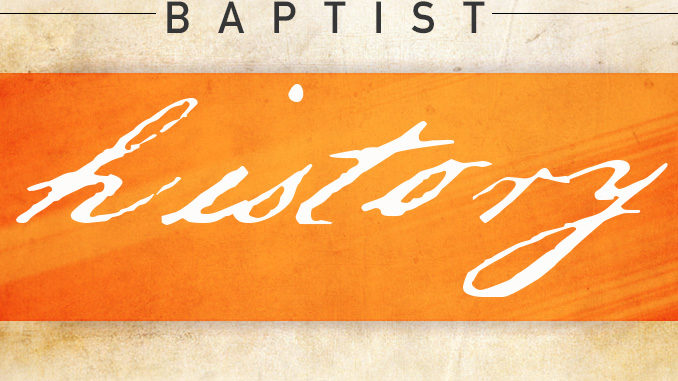
In almost every generation, some pastor or professor who claims to be a man of God and a follower of Christ, runs off the rails theologically, and begins to deny the inerrancy and authority of the Bible, either by open denial or, more often, by a “re-interpretation” of the text by imposing new and alien meanings on the words.
Any honest analysis of the words of Jesus as reported in the Gospels will conclude that Jesus was a Biblical inerrantist who accepted the statements of the Old Testament at face value, as always authoritative, and always absolutely true (see Robert P. Lightner, The Saviour and the Scriptures). It would seem immediately obvious that anyone who claims to be a follower of Jesus should of course believe about the Bible what Jesus did.
Though battles for Biblical inerrancy and against apostasy have been won through the years, such victories are never complete or final. Click To TweetBaptists historically have been just such followers of Jesus. While it is true that if you turn over enough rocks, you can find some self-professed “Baptist” who believes almost any absurdity, or believes nothing definite at all, denying even the plainest teaching of the Bible, yet Baptists historically and overwhelmingly have embraced the view of Scripture taught and believed by Jesus.
Baptists have openly and consistently declared their firm conviction that the Bible in all its parts is the product of Divine inspiration and as a result is entirely true and error-free, and the sole authoritative source of all theological truth.
The first London Confession of Faith (1644) declares (article VII): “The Rule of this Knowledge, Faith, and Obedience concerning the worship and service of God, and all other Christian duties, is not man’s inventions, opinions, devices, laws, constitutions, or traditions unwritten whatsoever, but only the word of God contained in the Canonical Scriptures.” (Lumpkin, Baptist Confessions of Faith, p. 158). Likewise, the Second London Confession (1677) begins, “The Holy Scripture is the only sufficient, certain, and infallible rule of all saving Knowledge, Faith, and Obedience,” (Lumpkin, p. 248)
The most influential Baptist writer of the 1700s was certainly John Gill (1697-1771), long-time pastor in London. In his Body of Divinity (1769, 1770), in the opening paragraph of chapter 2, he gives a representative Baptist view of the Scriptures:
“As what I shall say hereafter concerning God, His essence, perfections, person, works and worship, and everything relative to Him, will be taken out of the sacred Scriptures, and proved by them; it will be necessary, before I proceed any further, to secure the ground I go upon; and establish the divine authority of them; and shew that they are a perfect, plain, and sure rule to go by; and are the standard of faith and practice; and to be read constantly, studied diligently, and consulted on all occasions.”
The first Baptist in America to compose a systematic theology was J. L. Dagg (1794-1884). In his Manual of Theology, he wrote, “Whether, as a rule of faith, of duty, or of hope, the authority of the Bible is supreme . . . .When the Bible speaks, all else must be silent, and its decisions leave no room for doubt and admit no appeal,” (pp. 40, 41).
In England in the 1880s, Charles H. Spurgeon (1834-1892), becoming alarmed at the apostasy of some Baptists from belief in Biblical inerrancy and authority, confronted them in print and in person in what became known as the “Down Grade Controversy,” at great personal cost to himself (see his The “Down Grade” Controversy). Tragically, a large majority of English Baptist leaders did not side with Spurgeon, leading quickly to a rapid decline in the number and influence of English Baptists.
Professor Basil Manly, Jr. (1825-1892), in his volume The Bible Doctrine of Inspiration(1888), speaking for the entire faculty of Southern Baptist Seminary, wrote “The doctrine which we hold is that commonly styled PLEANARY INSPIRATION, or Full inspiration. It is that the Bible as a whole is the Word of God, so that in every part of Scripture there is both infallible truth and divine authority,” (p. 59)
Pastor and seminary founder B. H. Carroll (1843-1914), giant among Texas Baptists, joined his Baptist brethren in embracing fully the inspiration and inerrancy of Scripture, expressing his views in Inspiration of the Bible (1930).
W.A. Criswell (1909-2002) pastored the largest Baptist church in the world, and was president of the largest organization of Baptists in the world, the Southern Baptist Convention. He strongly embraced the Biblical and Baptistic doctrine of Bible inspiration and inerrancy, and vigorously defended it in the pulpit and in his writings, especiallyWhy I Preach that the Bible is Literally True(1969), a volume which earned him the hatred of apostates in the SBC schools and churches, and the enduring gratitude and admiration of true Baptists everywhere.
Though battles for Biblical inerrancy and against apostasy have been won (though not always) through the years, such victories are never complete or final. There have been in recent days resurgences of denial of the Bible’s inspiration and authority by dismissing its plainest teaching on creation, miracles, Hell and more. Satan still casts aspersions on the Word of God by stealthily asking (through his human minions), “Did God reallysay, . . .?” And we must strongly counter his lies with a firm “Thus saith the LORD.” The inspiration, inerrancy and absolute authority of Sacred Scripture is the ultimate “fundamental.” Without it, there is no certainty about anything the Bible teaches.
For a valuable overview of historic Baptist beliefs regarding the Bible, see L. Russ Bush and Tom J. Nettles, Baptists and the Bible (1980; second edition 1999).
